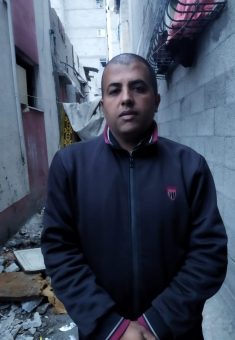A 38-year-old father of four from Beit Lahiya who moved among relatives in northern Gaza, describes the bombings, hunger and terrible living conditions in the area

Until 7 October 2023, my wife and I and our four children, Yazan, 8, Tala, 7, Lana, 2 and Yamen, nine months old, lived in our home in Beit Lahiya. On the very first day of the war, we fled to my sister’s house in Jabalya R.C. There was a bombing in the area the next day and dozens of people were killed and injured. My sister’s house was hit too, and it was sheer luck that none of us were killed or injured. We managed to move safely to my parents’ house in a-Rimal neighborhood in Gaza City.
We stayed there until, on Friday, 1 December 2023, the Israeli Shin Bet called us and ordered us to leave the house and go west. There were really heavy bombings in the area that very same night, and we took the kids and ran away from there the next morning. We moved in with some relatives who live near the a-Samer junction in Gaza City, and my parents moved with some other relatives to a school in a-Rimal neighborhood, 200 meters away from their house.
On 13 December 2023, Israeli soldiers surrounded the area of the school and arrested some of our relatives. Some of them were released the next day but some were kept in prison for 50 days. There was also tank shelling in the area and we ran away because the house we were in was close to there. This time we moved to my sister Widad’s apartment in a-Shati R.C. Widad and her family had already moved to Rafah and the apartment was empty, but we didn’t stay there long because there was no running water or food.
From there, we moved the building that houses The Center for Mind- Body Medicine for trauma treatment in a-Rimal neighborhood. We stayed there for about two weeks. The situation there was also difficult and we barely managed to get food and water. A bag of flour that cost NIS 30 (~ USD 8.4) before the war has gone up to NIS 600 (~ USD 168). We had to make do with one meal a day and there were days when we didn’t eat at all. Sometimes, the neighbors gave us some water and food. It was also very dangerous to go out to stock up on food because of the gunfire and bombings.
After about two weeks, we heard that the Israeli tanks withdrew from Jabalya R.C., and we went back there. We lived at my 87-year-old aunt Meyasar's house, even though part of the building was destroyed in the bombings. We’ve been here ever since. We settled on the first floor and covered the windows with plastic sheets, but still, it’s cold here and the rain gets inside. Once every 10-15 days, water is supplied, and sometimes, it’s possible to get flour and make pita bread, but most of the time, we really have nothing to eat. In the past month, we’ve had less than one meal per day.
Because of the hunger, my wife can barely nurse our nine-month-old son, Yamen, and baby formula is nowhere to be found either. A little while ago, we managed to buy a kilo of dates for NIS 40 (~ USD X), which has been helping us survive. We live off what we manage to get - a little rice, a little corn we ground, and also barley, which is meant for feeding farm animals. The price of barley has also gone crazy. Now even the barley ran out and people have started grinding bird and rabbit food. But there is not much of that either. There is no food for humans or for animals.
We’ve never been in this situation. People here got hepatitis because of the contaminated water, the lack of cleaning materials and the garbage that piles up everywhere. We heard that aid packages sometimes arrive in the north, but they don’t reach our area. We also heard that the army sometimes shoots people who crowd to receive food parcels.
I never thought we would get to this point. Most of the people here are starving and thirsty. People just die on a daily basis. We live in constant fear of Israel’s bombings and gunfire. We’ve gone through unimaginable things.
*Testimony collected B’Tselem field researcher Muhammad Sabah on 19 February 2024.